I am the messenger
I am the messenger
I am the messenger
Across the silent down, weeping with the dew;
Across the sleeping town, waking but a few;
Across the quiet farm, rousing drowsy lark;
Across the old school playing fields, across the misty park
Across the trees, across the land, across all that's high and low
I harvest, reap and then I keep before I slink below
I drain away vitality, then tug you underground;
Naked, cold, forgotten; entombed without a sound.
I am the messenger
I am the messenger
I am the messenger
“I am a messenger who will bring back word from the men who are fighting to those who want the war to go on forever. Feeble, inarticulate will be my message, but it will have a bitter truth and may it burn their lousy souls.” Paul Nash, artist
“We're telling lies; we know we're telling lies; we don't tell the public the truth, that we're losing more officers than the Germans, and that it's impossible to get through on the Western Front.” Lord Rothermere, newspaper owner
“Two armies that fight each other is like one large army that commits suicide.” ― French soldier Henri Barbusse, in his novel "Le Feu", 1915
“In no circumstances whatever will the expression 'shell-shock' be used verbally or be recorded in any regimental or other casualty report, or in any hospital or other medical document.” ― British army General Routine Order No. 2384, issued on 7 June 1917 in France.
“Once lead this people into war, and they'll forget there ever was such a thing as tolerance. To fight, you must be brutal and ruthless.” ― American president Woodrow Wilson.
“We are within measurable, or imaginable, distance of a real Armageddon.” ― British Prime Minister Henry Asquith, one week before the war started.
“Never had the machine-gunners such straightforward work to do nor done it so unceasingly.” ― German Regimental Diarist at the Battle of Loos where the Allies suffered over 80% losses.
“Independent thinking is not encouraged in a professional Army. It is a form of mutiny. Obedience is the supreme virtue.” ― British Prime Minister Lloyd George in his 'War Memoirs'
“As a result of continuous work with these highly toxic substances, our minds were so numbed that we no longer had any scruples about the whole thing.” ― Otto Hahn, German scientist and co-inventor of war gas.
“Dearest Mother, No-man's land under snow is like the face of the moon: chaotic, crater ridden, uninhabitable, awful, the abode of madness.” ― Wilfred Owen, in a letter to his mother, January 1917
The abode of madness
The abode of madness
The abode of madness
The abode...the abode….the abode
The abode….of madness...
I am the m-m-m-m-messenger!
I am the m-m-m-m-messenger!
I am the m-m-m-m-messenger!
I am the messenger
I am the messenger
Across the silent down, weeping with the dew;
Across the sleeping town, waking but a few;
Across the quiet farm, rousing drowsy lark;
Across the old school playing fields, across the misty park
Across the trees, across the land, across all that's high and low
I harvest, reap and then I keep before I slink below
I drain away vitality, then tug you underground;
Naked, cold, forgotten; entombed without a sound.
I am the messenger
I am the messenger
I am the messenger
“I am a messenger who will bring back word from the men who are fighting to those who want the war to go on forever. Feeble, inarticulate will be my message, but it will have a bitter truth and may it burn their lousy souls.” Paul Nash, artist
“We're telling lies; we know we're telling lies; we don't tell the public the truth, that we're losing more officers than the Germans, and that it's impossible to get through on the Western Front.” Lord Rothermere, newspaper owner
“Two armies that fight each other is like one large army that commits suicide.” ― French soldier Henri Barbusse, in his novel "Le Feu", 1915
“In no circumstances whatever will the expression 'shell-shock' be used verbally or be recorded in any regimental or other casualty report, or in any hospital or other medical document.” ― British army General Routine Order No. 2384, issued on 7 June 1917 in France.
“Once lead this people into war, and they'll forget there ever was such a thing as tolerance. To fight, you must be brutal and ruthless.” ― American president Woodrow Wilson.
“We are within measurable, or imaginable, distance of a real Armageddon.” ― British Prime Minister Henry Asquith, one week before the war started.
“Never had the machine-gunners such straightforward work to do nor done it so unceasingly.” ― German Regimental Diarist at the Battle of Loos where the Allies suffered over 80% losses.
“Independent thinking is not encouraged in a professional Army. It is a form of mutiny. Obedience is the supreme virtue.” ― British Prime Minister Lloyd George in his 'War Memoirs'
“As a result of continuous work with these highly toxic substances, our minds were so numbed that we no longer had any scruples about the whole thing.” ― Otto Hahn, German scientist and co-inventor of war gas.
“Dearest Mother, No-man's land under snow is like the face of the moon: chaotic, crater ridden, uninhabitable, awful, the abode of madness.” ― Wilfred Owen, in a letter to his mother, January 1917
The abode of madness
The abode of madness
The abode of madness
The abode...the abode….the abode
The abode….of madness...
I am the m-m-m-m-messenger!
I am the m-m-m-m-messenger!
I am the m-m-m-m-messenger!
inviata da Dq82 - 5/12/2018 - 16:51
×
![]()

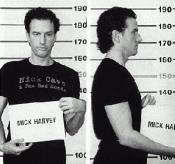
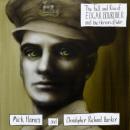

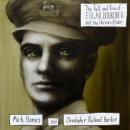

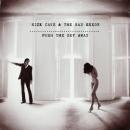
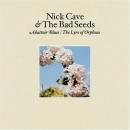
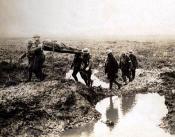
The Fall and Rise of Edgar Bourchier And the Horrors of War
La premessa è sufficiente a sgomberare il campo da ogni dubbio circa la levatura artistica di un musicista che, nonostante le notevoli prove d’autore fornite anche con la sua carriera solistica, è riuscito a rimanere, suo malgrado, sempre un po’ fuori dal circuito mainstream, in un’aura di marginalità nobile e per certi versi salvifica, che gli ha consentito di fare scelte creative talvolta ardite. Ne è la riprova questo suo ultimo, temerario lavoro, scritto a quattro mani con lo scrittore Christopher Richard Barker, per il quale ha musicato e interpretato le testimonianze immaginarie di un personaggio romanzato, il poeta di trincea Edgar Bourchier, che racconta in un variegato registro narrativo le efferatezze e le brutalità sul campo di battaglia della Prima Guerra Mondiale.
The Fall and Rise of Edgar Bourchier And the Horrors of War esce in occasione del centenario dell’Armistizio, e contiene in sé uno storytelling dall’approccio onnicomprensivo, che raccoglie frammenti multiformi di memorie immaginate, in cui entrano in gioco la paura, la giovinezza, la rabbia, la nostalgia, il senso d’inutilità. Dal punto di vista compositivo, è interessante constatare l’ambiziosa carrellata dei generi attraversati: dal folk tradizionale, che richiama un tempo perduto evocando strumenti antichi come le fisarmoniche, oltre all’inevitabile corredo di piani e chitarre acustiche (Pounding for Peace, The Poetic Clown), al post punk in pieno stile Birthday Party (Poor Por Surgeon Tim, The Expressionist #2, Corpse 564), sino alla dark wave vera e propria, con i sussurri di I Am The Messenger o The Lost Bastard Son of War, il cui riff pare emulare dichiaratamente She’s Lost Control dei Joy Division. Interessante anche l’esperimento di The Expressionist #1, dove una marcia militare e i cori che la scandiscono, sembrano voler diventare un ritmo punk.
In questo riuscito progetto atemporale, in cui sia la storia narrata che gli stili musicali richiamano il passato con un chiaro e costante riferimento al presente e una sapiente lettura contemporanea, troviamo il condensato di quello che dovrebbe essere un disco autoriale: una buona storia e un credibile incedere narrativo. Il messaggio è chiaro in tutto il suo ineluttabile pathos, eppure l’atmosfera in cui quel messaggio aleggia non appare mai enfatica e greve. Rischiava di essere un lavoro pretenzioso, è riuscito a non esserlo.
sentireascoltare.com